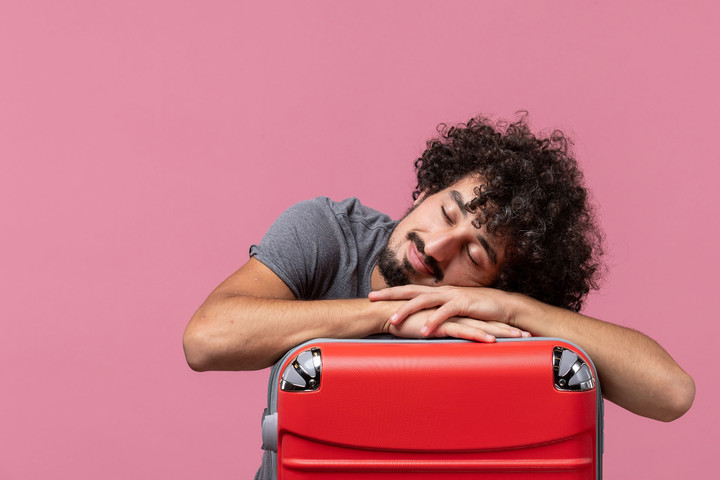5 Tips to Beat Jet Lag & Sleep Well Again
Posted by SleepSense on 31st Oct 2023
Jet lag, that dreaded side effect of long-distance travel, can wreak havoc on your body's internal clock, leaving you groggy, disoriented, and sleep-deprived. Whether you're a frequent traveler or just embarking on a once-in-a-lifetime journey, understanding how to beat jet lag is essential for a smoother transition and a more enjoyable trip. In this article, we'll explore five effective techniques to help you overcome jet lag and get your sleep schedule back on track.
1. Pre-Travel Preparations
One of the most effective ways to combat jet lag is by planning ahead and making some preparations before you even set foot on the plane. Here are some key pre-travel strategies:
Adjust Your Sleep Schedule
A few days before your departure, start shifting your sleep schedule gradually to align with your destination's time zone. Go to bed and wake up an hour earlier or later each day, depending on the direction of travel. This gradual adjustment can help reduce the shock to your internal body clock.
Hydration and Diet
Staying well-hydrated is crucial, as dehydration can exacerbate the symptoms of jet lag. Drink plenty of water in the days leading up to your trip and during your flight. Avoid excessive alcohol and caffeine intake, as these can disrupt your sleep patterns.
Choose Flight Times Wisely
When booking your flight, consider the time of day you'll arrive at your destination. If possible, opt for flights that align with your destination's local time, allowing you to acclimate more smoothly upon arrival. Red-eye flights that arrive early in the morning can be particularly challenging for overcoming jet lag.
2. In-Flight Strategies
Once you're on the plane, there are several strategies you can employ to reduce the impact of jet lag during the flight itself:
Manage Sleep and Activity
Decide when to sleep based on your destination's local time, not your departure city. Use eye masks, earplugs, or noise-canceling headphones to create a more comfortable sleep environment. Avoid excessive screen time and try to relax with a book, soothing music, or meditation.
Stay Hydrated and Skip Alcohol/Caffeine
Cabin air is dehydrating, so continue to drink water throughout the flight. Avoid alcohol and caffeine, which can disrupt your sleep and contribute to dehydration.
Stretch and Move
Periodically get up from your seat to stretch and walk around the cabin. Simple exercises, like ankle circles or shoulder rolls, can help prevent muscle stiffness and improve circulation.
Use Sleep Aids Sparingly
While it might be tempting to rely on sleep aids, use them sparingly and consult your healthcare professional before doing so. Some over-the-counter or prescription sleep aids can have side effects or interact with other medications.
3. Upon Arrival
The moment you land, it's crucial to adapt to the new time zone as quickly as possible. Here are some post-arrival strategies to help you adjust:
Exposure to Natural Light
Spend time outdoors during daylight hours to help reset your body's internal clock. Natural light exposure, especially in the morning, can signal to your brain that it's time to be awake.
Avoid Napping
Resist the urge to take a long nap upon arrival. While a short power nap might be necessary to overcome immediate fatigue, try to stay awake until the local bedtime to encourage your body to adjust more rapidly.
Stick to a Meal Schedule
Eating regular meals at your destination's local meal times can help regulate your body's internal clock. Avoid heavy, high-fat meals close to bedtime, as they can disrupt your sleep.
Stay Active and Manage Fatigue
Engage in light physical activity to boost your energy levels and stay active during the day. Avoid strenuous workouts close to bedtime, as they can stimulate your body when it should be winding down.
4. Sleep Aids and Supplements
While it's generally advisable to use sleep aids and supplements as a last resort, they can be helpful in certain situations. Here are some options to consider:
Natural Remedies and Supplements
Melatonin is a hormone that regulates sleep-wake cycles. Taking a low dose of melatonin at bedtime may help adjust your sleep patterns to the local time zone. Consult your healthcare provider before trying any supplements.
Prescription Medications
In some cases, your doctor may prescribe medication to help you manage severe jet lag symptoms. These medications should be used under medical supervision and as a last resort.
5. Lifestyle Adjustments
Lastly, maintaining a healthy lifestyle can contribute to better sleep and an easier adjustment to a new time zone:
Hydration and Diet
Continue to prioritize hydration and maintain a balanced diet throughout your trip. Nutrient-rich foods can help provide energy and support your body's natural sleep patterns.
Regular Exercise
Incorporate regular exercise into your daily routine, as it can improve sleep quality and help your body adjust to a new time zone. Aim for activities that promote relaxation, such as yoga or tai chi.
Stress Management and Relaxation Techniques
Practicing stress-reduction techniques like meditation, deep breathing, or progressive muscle relaxation can help you stay calm and ease the transition to a new time zone.
In conclusion, jet lag is a common challenge for travelers, but it's not insurmountable. By implementing these five techniques, you can significantly reduce the impact of jet lag and help your body adjust to a new time zone more smoothly. With some careful planning and a focus on self-care, you'll be well on your way to beating jet lag and getting your sleep schedule back on track during your travels.
Image by KamranAydinov on Freepik

